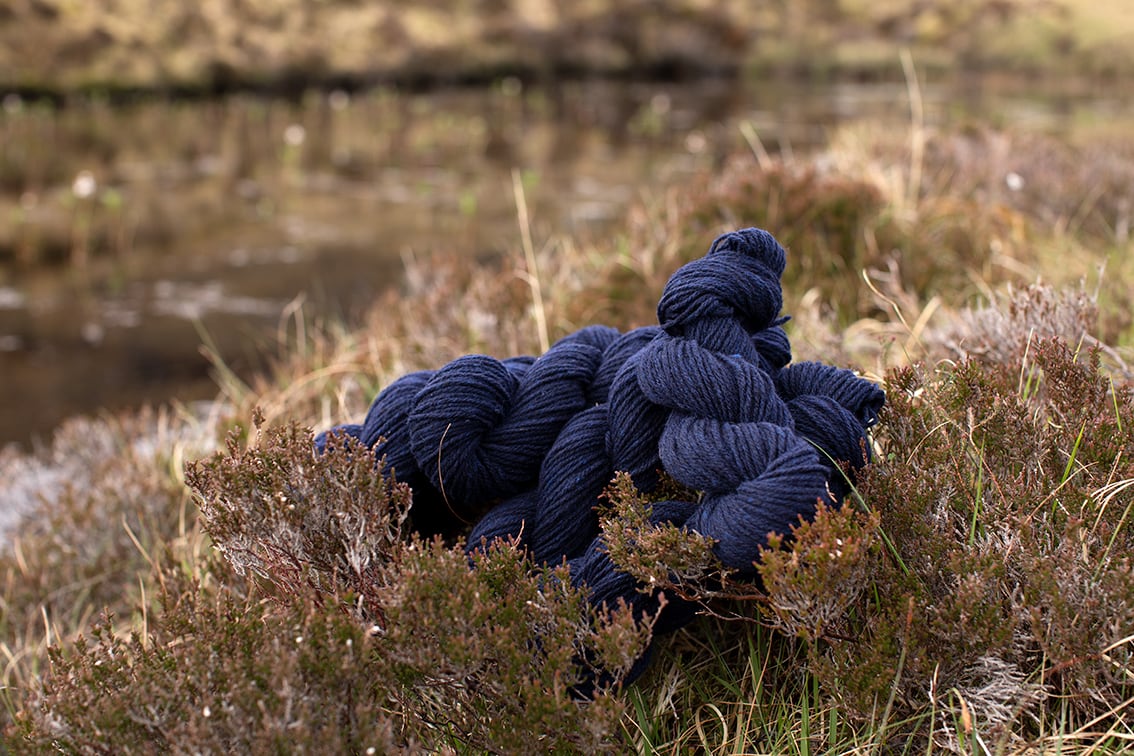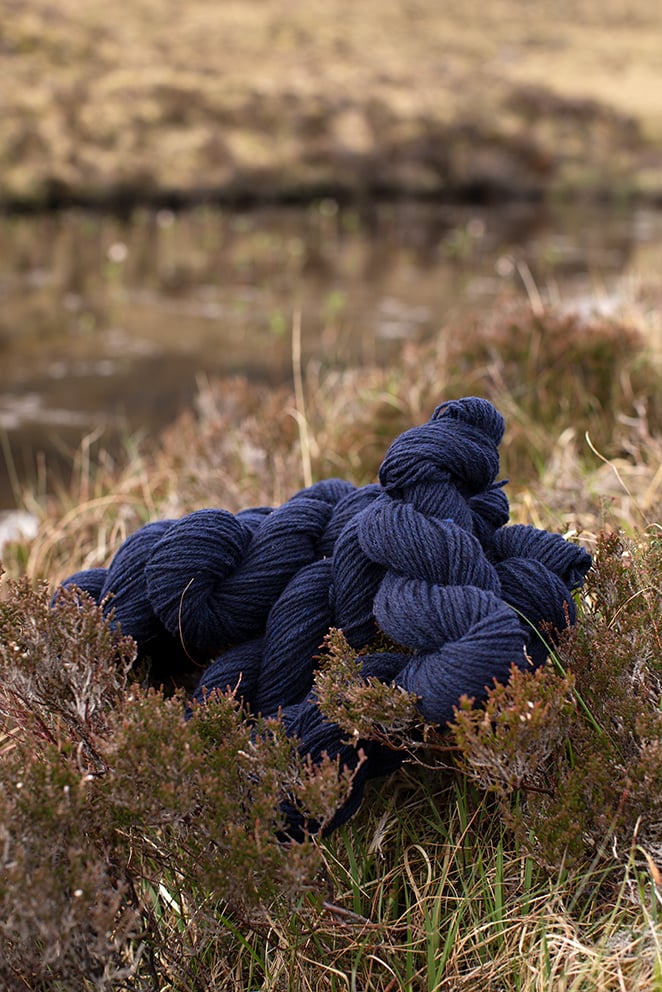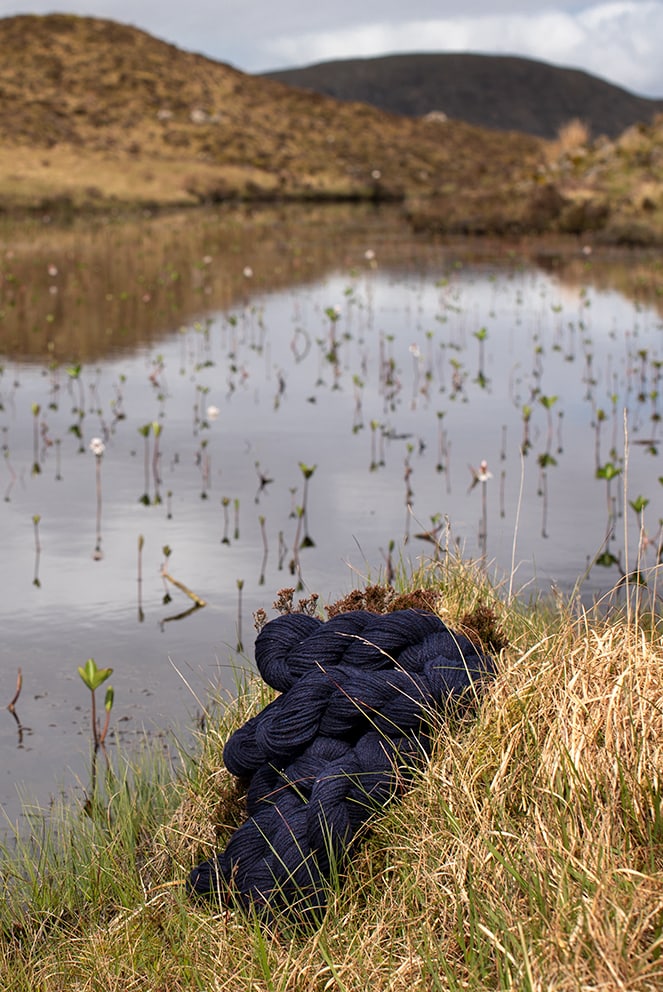Kelpie – 50g Hebridean 3 Ply
Description
Alice Starmore Hebridean 3 Ply Yarn is made from premium quality pure new British wool, dyed in the fleece and skillfully blended into unique shades. It is hand-washed and dried in the Hebridean air, and supplied in hand-made skeins which may vary in weight. It is priced per 50g at standard conditions. All yarn is weighed to order on balances that are checked daily to ensure that you receive the correct total amount.
Kelpie is part of the Moor & Mountain range, which is inspired by the landscape of the Outer Hebrides.
£8.00

Kelpie Colour Story
All cultures have their own particular myths about water and – if legend is to be believed – Scotland is certainly no exception. From the sea with its serpents, sirens and mermaids, to the fabled loch Ness Monster, it would seem that we are well stocked with strange water creatures. One of the oldest and most dangerous water spirits resides only in the more remote parts of the Highlands and Islands. It is the Kelpie, or in Gaelic the Uisge Each, or Waterhorse. This evil spirit spends the daylight hours lurking in the deepest parts of the freshwater lochs which cover the moorlands. As dusk approaches it rises to the surface, turning the loch to a deep stormy blue. When the sun has set the Kelpie emerges, taking on the shape of a large black horse or bull, and begins searching the land for lone wanderers. Anyone encountering a Kelpie must keep their eyes on the earth and make haste for the nearest dwelling. If curiosity overcomes them and the traveller looks directly at the Kelpie, then they will be spellbound and climb onto the demon's back. The Kelpie will then turn and gallop back into the loch with its prey. One can avoid this gruesome fate by being brave, pure in heart, and by always carrying a bible. If hard-pressed by a Kelpie, use a corner of your bible to draw a circle on the ground all around you, and the demon will not dare to cross the line.
Mysterious disappearances in the past were more likely to be the result of clan fighting or treacherous peat bogs, but it cannot be denied that certain lochs do occasionally take on a rather sinister aspect for reasons which do not appear to be weather related. Our Kelpie colour captures the wild but beautiful shades of deep, dark vibrant blues which give such a mysterious quality to moorland lochs.
Kelpie tales tend to be rather similar and all from long ago, so if you have the time here is a modern one with a difference. It is called The Kelpie and the Accordionist.
It is said in the Outer Hebrides that if you have a loch right beside a mountain, then the loch will be as deep as the mountain is high. If that is true, then Loch a' Mhorghain must be very deep indeed, for a mountain called Sgaoth Iosal forms its southern edge, and its craggy sides plunge sheer and straight into the dark water. It is an impressive place and must have been terrifying in the days when legends and superstitions were closer to our lives than they are today. The road from Stornoway to Tarbert in Harris now runs along the other shore of Loch a' Mhorghain, so we now pass it in our warm comfortable cars, but even now it can cast a sinister chill when the sun dips behind the mountains and leaves the loch in deep shadow. At such times it is not hard to believe that something wicked lives down there. There is one man who certainly believes, and he has good reason to – if he can be believed himself. I make no judgement in the matter, but relay the tale to you exactly as it was told to me.
Roddy C. is an excellent accordionist much in demand at dances, ceilidhs and other such functions. He loves music, good company, good drink and good food, and his imbibing of the last two have made him uncommonly tubby. He also appreciates good cars and pretty female faces, although I wouldn't care to debate which he would rank first. However, he is an old fashioned romantic who thinks that nothing is ever a lady's fault, and is blessed with a supreme sense of humour, so I suppose he could be placed in the category of loveable rogue. As well as playing for the entertainment of others, Roddy makes it his mission to pass on his skills to the young, and holds accordion classes all over the island. Several nights a week he gets into his battered old Mercedes – he needs such a car to cope with his bulk – and takes off for remote corners of the island where he happily teaches in draughty village halls.
Wednesday nights are reserved for Tarbert, and it was here that one night ten years ago, he was teaching his small class as usual. Class ended at nine-thirty prompt, for Roddy wanted to get back across the border into Lewis and have a dram or two before sitting down to a substantial late supper. The accordion was stowed in the back of his car and off he went.
The road from Harris to Lewis leaves Tarbert and quickly begins a long ascent into the mountains. The ascent is so marked that your ears "pop" near the summit. Half way up there is a small cluster of dwellings called Ardhasaig, and the ascent is therefore known as the Ardhasaig Brae. There has been a small roadside shop in Ardhasaig since time immemorial, and for some unknown reason, this shop has a licence to sell strong drink. Roddy made it a Wednesday ritual to call in and purchase a quarter of boiled sweeties to sustain him on the journey, and a bottle of whisky of a brand called Old Aberdonian for when he got home. This particular brand of whisky is rough stuff by the way, but Roddy's romantic nature won't allow him to think ill of anything that comes out of Harris, and so he regards it as the dram of the gods.
On this Wednesday in late May, Roddy was just reaching the top of the Ardhasaig Brae, sucking on a pineapple cube and thinking happily about the bottle of Old Aberdonian that nestled in the back seat beside his accordion. The Brae can leave an underpowered car straining and chugging, but the big old Mercedes was well into its stride. The road used to be terrible – single track with passing places for most of the way. It had been recently upgraded to a two-lane road however, apart from the section adjacent to Loch a' Mhorghain, where a combination of limited space and unlimited rock made the upgrade financially impractical. It was quarter to ten on this airy May evening when Roddy approached the loch, and although he had not switched on his headlights so far, he saw they would be needed when he reached the shadow zone ahead. He duly switched them on when he reached the stretch of single track road, and saw another pair of lights approaching him. By all the rules of single track driving, the other car should have pulled into the passing place, for it was closer to it that Roddy was. However, the driver put the hammers down and was obviously not going to stop. Roddy was open-mouthed in amazement, but had no choice other than to swerve onto an area of rough but vaguely flat gravel that was fortunately right beside him. The swerve was so violent that his Mercedes stalled, just as the oncoming car sped by him in a shower of flying stonechips.
Roddy cursed the boy racer to a certain warm place and back again before restarting his car. It refused. He tried again and again with no result. It was then he noticed that the surface of Loch a' Mhorghain seemed to be boiling and the rising steam was obscuring the road both in front and behind him. Despite being an incurable romantic in all matters relating to Scotland and the opposite sex, Roddy C. had the deeply practical streak of his fisher-crofter ancestors, which is why – when the coal black stallion emerged from the loch – he thought his pineapple cube must have been spiked with something hallucinogenic. Typical of Harris, he thought. They were always away with the fairies. It didn't help him with the equine problem however, for the horse now had a hoof on the front of the Mercedes and was looking at him with blazing eyes.
Roddy got out of the car and faced the Kelpie. "Will you steady on, boy!" he remonstrated. "There's enough scratches on the old bus already without you putting your great hooves all over it. Do you think I'm made of money or something? Do I look like a man who can afford a complete respray?"
"You'll not be needing it where you are going," the Kelpie replied in a voice that sounded like it had gurgled its way up from the bottom of a very deep well.
"And where might that be?" Roddy asked. The horse tossed his mane towards Loch a' Mhorghain and ordered Roddy to climb upon his back.
"I was never terribly good at the horseriding," Roddy said. "But if I'm going down there with you for all eternity, can I have just one quick tune on the old box before I go? Just for old time's sake."
The Kelpie pawed the ground impatiently, but said, "If you must."
Roddy took his accordion from the back of the car, but before slinging it around his shoulders he opened the bottle of Old Aberdonian and took a hefty pull. "Do you fancy a drop yourself?" he asked. "Just a tincture to keep out the cold?"
"I am never cold," the Kelpie replied. "But I will try a drop anyway. I have never heard of a whisky called Old Aberdonian."
"Oh, the best, the best. The very best," said Roddy, and held the bottle up to the horse's mouth, ignoring rows of razor teeth and a smell like rotting fish. He poured in most of the contents and the Kelpie was rendered speechless. Before it could finish coughing and choking, Roddy C. began to play. He played The Barren Rocks of Aden which under the hands of a master can send notes flying out like machine gun bullets. His fingers flew, the notes flew, and the Kelpie's hooves began to dance in time to the music. Faster and faster went Roddy's fingers and faster and faster went the tune. Never did a circus horse perform like that dancing Kelpie, for the sound of its hooves flew out over dark water, struck the flank of Sgaoth Iosal and echoed down the Ardhasaig Brae. Then, with the skill born of looking out from the stage over thousands of heaving, reeling island dancefloors and knowing exactly what was required, Roddy slackened the pace seamlessly into the leisurely strains of Katy Martin's Waltz. The Kelpie's flying hooves settled into steady four-time and started to sway from side to side. Roddy gave it a full ten minutes of this before launching – again seamlessly and with never a jarring note – into The Dark Isle.
Now The Dark Isle is one of those tunes that is famous throughout Scotland. It is played clear from Stornoway to Stonehaven, wherever Scots gather for a little traditional revelry. It is a tune for the end of the evening, when the hour is growing late and folk are a little misty eyed. Played badly, The Dark Isle can send everyone rushing home to their beds; played well it is a melody of such haunting power and beauty that grown men will start to weep for mountains and glens they have never even clapped eyes on. Roddy C. was a good player at all times, but on this night beside Loch a' Mhorghain his performance was masterly, for he knew he was playing for his life.
The first strains of the melody drifted from the accordion and settled on the surrounding land like descending angels. The Kelpie stood stock still and then raised his great head towards the night sky. At first the music flowed quietly, reminding the Kelpie of when he was a foal, running over the mountainsides in the time before humankind ever set foot on the island shore. Then he thought of the mother who had left him shortly after. It is the way of Kelpies to do this, for they are solitary demons, but he remembered the way she would nuzzle him and he started to shed a large tear. Roddy saw this and increased the volume slightly, making the Kelpie remember the times five-thousand years distant, when great circles of stone were reared on the island in which the newly arrived humans practiced long forgotten rites and rituals. The Kelpie was great and powerful then, and some humans even worshipped him, so he shed another tear for those long-lost days. Roddy saw that too and let the melody break free to the mountaintops where it swirled and echoed and made the Kelpie revel in the majesty of his land. But it also evoked something else in his mind. It made him think of the steady drip of years that had gradually turned him from a force to be reckoned with to just a dim legend, scoffed at by a few and unheard of by many. Huge tears filled his eyes and quenched the deep red that burned there. The Kelpie laid his head briefly on Roddy's shoulder and then turned and slid quietly into the loch. Roddy brought the melody to a lingering conclusion as the ripples gradually died away.
Man, what a tune, Roddy thought as he packed away his accordion. It never fails. Slays them every time. He took a well-earned swig of the remaining Old Aberdonian and tried the car ignition, which fired first go. Sucking on a new pineapple cube, Roddy C. rolled down the mountains towards the Lewis moorlands and his long-awaited supper.
As I mentioned before, I refuse to comment on the truth of this story. It is exactly as told to me, so take it or leave it. All I can say is that some people believe it – or at least pretend they do – for a new phrase seems to have cropped up in recent years. I have overheard it on a few occasions when things were going slightly wrong for somebody. "Oh man!" you may hear. "It's enough to make a Kelpie cry."





